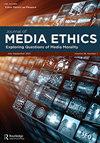Special call from the Journal of Media Ethics: Media Ethics and Impermanence/Permanence
IF 1.1
3区 哲学
Q3 COMMUNICATION
引用次数: 0
Abstract
Alvin Toffler wrote more than 50 years ago that modern civilizations, as they acquired more knowledge and technology, were exhibiting increased impermanence. The rates of change throughout modern societies were exponential, becoming more pronounced and occurring within shorter intervals, he said, with such impermanence “leading to less time for extended peaceful attention to one problem or situation at a time.” However, Toffler did not anticipate countervailing trends that point to different forms of emerging permanence. For example, individuals’ online profiles can continue well past their deaths, and mechanized and automated ways of creating products are increasingly intensifying. As these dynamics exhibit themselves today – particularly manifested in humankind’s struggle to attend to cultural disruptions, socio-economic upheaval, and increased exposures to risk and crises – how is media ethical theory and practice best situated to rise to the challenge? For example, how does message production, audience consumption of mediate messages, and media professional practice point to questions about constructive and beneficent ways to address this duality? Additionally, how are shifting applied and theoretical understandings of “media” interacting with (and within) the impermanence/permanence continuum? That is, while ethics can serve as an enduring foundation for sound decisions that, for example, reflect a respect for autonomy, duty, and virtue, how do purveyors of media translate their activities in such a way that ethically ameliorates the fractured nature of the impermanence/permanence dynamic and, in the process, help society move toward more just decisions? A special issue of the Journal of Media Ethics is planned to showcase scholarship regarding this subject from diverse perspectives focused on news, public relations, marketing, advertising, or new media (e.g., social media, gaming, etc.) use. Efforts to explore related issues of digital presence, identity, and community formation also are of interest. Both empirical studies and philosophical explications that explore media ethics questions from scientific and humanities traditions are encouraged. Also encouraged are examinations of both historical and contemporary aspects and essays that explore broader theoretical constructs of the role of ethics in the face of broader impermanence/permanence dynamics. Polemical essays are discouraged. Case studies are welcome if they provide relevance beyond local or national boundaries. Manuscripts should be submitted by September 30, 2020, for consideration. All authors must prepare their work for blind review by following Journal submission guidelines, which can be found here: http://www.tandfonline.com/toc/hmme20/current《媒体伦理杂志》特别呼吁:媒体伦理与无常/永恒
阿尔文•托夫勒(Alvin Toffler) 50多年前曾写道,随着现代文明获得更多的知识和技术,它们表现出越来越多的无常。他说,整个现代社会的变化速度是指数级的,变得更加明显,而且发生的间隔时间也更短,这种无常“导致人们一次对一个问题或一种情况进行长期和平关注的时间更少”。然而,托夫勒并没有预料到相反的趋势会指向不同形式的新兴持久性。例如,个人的在线档案可以在他们死后很长一段时间内继续存在,创造产品的机械化和自动化方式正在日益增强。随着这些动态在今天表现出来——特别是在人类努力应对文化破坏、社会经济动荡以及日益暴露于风险和危机之中——媒体伦理理论和实践如何才能最好地应对挑战?例如,信息生产、受众对中介信息的消费以及媒体专业实践如何指向有关解决这种二元性的建设性和有益方法的问题?此外,对“媒介”的应用和理论理解如何与无常/永恒连续体相互作用(以及在其中相互作用)?也就是说,虽然道德可以作为健全决策的持久基础,例如,反映对自治,责任和美德的尊重,但媒体的提供者如何以这样一种方式翻译他们的活动,从而在道德上改善无常/永恒动态的断裂性质,并在此过程中帮助社会走向更公正的决策?《媒体伦理杂志》计划出版一期特刊,从新闻、公共关系、市场营销、广告或新媒体(如社交媒体、游戏等)使用的不同角度展示有关这一主题的奖学金。努力探索数字存在,身份和社区形成的相关问题也很有趣。鼓励从科学和人文传统中探索媒体伦理问题的实证研究和哲学解释。同时鼓励对历史和当代方面的考察,以及在面对更广泛的无常/永恒动态时探索更广泛的道德角色的理论结构的论文。不鼓励辩论性文章。欢迎案例研究,如果它们提供超越地方或国家边界的相关性。稿件应于2020年9月30日前提交,以供审议。所有作者都必须按照期刊投稿指南准备盲审,该指南可在这里找到:http://www.tandfonline.com/toc/hmme20/current
本文章由计算机程序翻译,如有差异,请以英文原文为准。
求助全文
约1分钟内获得全文
求助全文

 求助内容:
求助内容: 应助结果提醒方式:
应助结果提醒方式:


